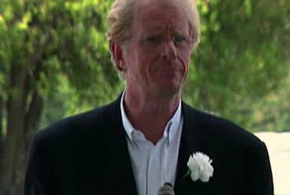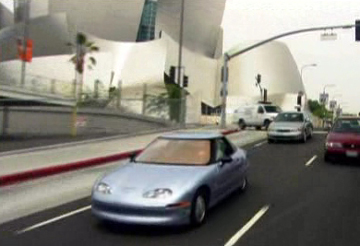
 |
|
|
|
After seeing Who Killed the Electric Car? it seems unthinkable to give billions of bailout dollars to corporations with so little regard for the public good. The vital docu Who Killed the Electric Car? has been out for two years; we have to think that its reissue has been timed to accompany the inauguration of President Obama. Fueled by the Iraq war, global warming and the collapsing economy, its message is more important than ever. The brief ten-year life span of the EV (electric vehicle) is treated like a murder mystery, an apt analogy indeed. Writer-director Chris Paine lays out clear evidence of the abuse of corporate power. The result is both entertaining and moving -- and of critical importance to our future. I remember when I saw my first General Motors EV-1; it was in the parking lot of a Ralph's store that had just installed two electric recharging parking slots. When the sleek, futuristic car drove away, it was almost silent. I wanted one, but the lease rate was too high. Newspaper articles and editorials expressed doubts about the car's practicality. How long would its battery last, and how expensive would it be to replace? 
When California advanced a mandate requiring EVs, General Motors responded with legal appeals. The docu convinces us that the automaker marketed and leased a small number of EV-1's only to give the appearance of compliance with the law. Ads announced that the cars would be leased only, not sold. Interviewees, including GM employees, charge that the company discouraged interest in the car by limiting production and stressing negative factors. Leassors of EVs offered by several companies enthused about the cars, which exhibited few if any problems. They could be charged at home and recharging stations were being built throughout Los Angeles. True, many new EV-1 drivers were ecology-minded show business people. Mel Gibson, Alexandra Paul and Tom Hanks go on record as boosters, while Peter Horton talks about how difficult it was to lease an EV-1 -- his GM salesman seemed to be blocking the deal. Who Killed the Electric Car? shows that the hotly desired EVs were a viable alternative to internal combustion engines. It counters spurious but widely repeated rumors that the cars pollute by adding to the need for electricity. The docu touches on some interesting aspects of GM's "anti-marketing" campaign. A magazine spread shows a scarecrow watching a distant EV-1, artwork that looks more suitable for a horror film. TV spots stress an ominous future -- shadows, the car always in the distance -- instead of "now" images of happy consumers enjoying their cars. The anti-EV lobbying and PR campaigns bore fruit when California backed away from its mandate for emission-free vehicle production. We see a hearing at which car company reps are allowed to present full arguments, but pro- electric voices were limited to three minutes at the microphone. The official approving the policy reversal is revealed to have taken a job representing the fuel-cell industry just weeks before the vote came up. Almost perversely, new legislation gave substantial tax credits to purchasers of the gas-guzzling Hummer, the vehicle that replaced the EV-1 on the GM assembly line. 
When the leases for the EVs matured, the car companies refused to renew them. Despite the objections of the leassors, all of the cars were reclaimed by GM. EV-1 owner's clubs publicized their cause by staging a mock funeral for the electric car. We see Ed Begley Jr., a prominent early-adopter electric enthusiast, taking part in the stunt by offering a sarcastic eulogy for the EV. The car was a sad failure, says Begley -- it was the perfect non-polluting vehicle for only 90% of our auto needs. The docu recounts how the oil and rubber industry established a monopoly in the 1950s by ridding Los Angeles of its electric public transportation system. Ignoring readily available electric cars, the energy industry and the Bush administration now insist that fuel-cell technology is the wave of the future. Who Killed the Electric Car? demonstrates that fuel cell public relations is a dodge to keep the public buying gasoline indefinitely. President Bush observes a hydrogen-refueling test station in operation, while an independent spokesman explains its nearly total impracticality. Meanwhile, ex- EV-1 owners must watch as their beloved cars are hauled to the scrap yards. Local L.A. TV personality Huell Howser visits a car-shredding facility just as a number of "retired" electric vehicles are destroyed. The owner of the facility says he hasn't been given a good reason for their destruction. 
Who Killed the Electric Car? leaves little room for ambiguity; it's plainly obvious that powerful industries terminated the "electric experiment" as soon as they succeeded in getting the law changed. Peter Horton can only laugh as he watches his EV-1 being hauled away. A young enthusiast who initially helped GM promote the car must visit an auto museum to see the single vehicle spared from the crusher. GM has made sure that the car's "insides" have been removed, of course. The docu reminds us of The Water Engine, a 1977 play by David Mamet. A man invents an engine that runs on water, only to find that business interests immediately plot to suppress the development. Once called anti-capitalist propaganda, the play seems to have the truth down cold. Powerful industries will do anything to maintain the status quo. After seeing Who Killed the Electric Car? it seems unthinkable to give billions of bailout dollars to corporations with so little regard for the public good. The first precondition should be to reintroduce the electric cars! The war in Iraq and the skyrocketing cost of gasoline has reignited the outcry about the "murder" of automobile technology that could drastically reduce America's need for foreign oil. The film ends on a positive note, reporting that even more improved battery systems have been developed. The next logical step, according to the docu, is to convert our existing hybrids into plug-and-play rechargeables, a refinement that would substantially increase their gas mileage. 1 
Chris Paine's entertaining docu is aided by Martin Sheen's narration and interviews with knowledgeable people on both sides of the issue. Viewers will experience a strong desire to buy an electric car, or at least a hybrid. Sony's re-promote disc of Who Killed the Electric Car? comes with some deleted scenes, a music video and Jump-Starting the Future, a short film that amplifies the docu's message.
On a scale of Excellent, Good, Fair, and Poor, Footnotes: 1. A note from correspondent and friend Craig Reardon, about his experience trying to buy an EV: The EV-1 was actually promoted with very attractive brochures, as I recall, and prominently displayed at a dealership out in Thousand Oaks. I was given a thorough run-down (oops, maybe the wrong choice of words!) by a salesman, AND a test drive, so I can testify as an actual driver of the car that it was a blast to drive. It looked, felt, and sounded like the Batmobile! As it accelerated it issued a kind of high whine, like you would hear at the airport as planes taxied in and out, as heard through the windows at the terminals. I remember telling myself that I could as easily get used to this as to the "harummphh!" of a combustion engine, so beloved of 'purists' (and NASCAR lovers, who worship the inefficient, really obsolete technology of American cars.) I was shocked to learn that the car could only be leased, as if it was 'on trial', and that the lease would run to about $40K a year. That let me out, instantly. However, I did later see one parked at the old UA/Goldwyn lot, when I had to go over there around the same period of time. I also saw them on the street, albeit in the Malibu ($$) area. I have this documentary and I think it's obviously skewed in favor of the car, and the technology, but why not? It was, on the face of it, a real effort to do something different. MY big "?" is reserved for Toyota, which had an EV RAV4 for quite a while. When I looked into those I found out they were only for "fleet sales", and I wondered, what the hell for?! Somehow, good ol' Ed Begley, Jr. got a hold of one. I have no idea HOW he managed this, in view of my utter lack of success. The good news is that I'm all but certain that Toyota will soon incorporate regular plug-in technology for the Prius. Whether it will be retro-installable, I don't know. It's gotten to where you cannot travel anywhere in So. Cal. without seeing Priuses. Plug-in conversion kits are already available at websites.
Obama is now gunning for emission control, fuel reduction, electric cars on a fast track, all the things the special interests that were in bed with Bush feared and loathed. I agree that Detroit's biggest (former) industry should learn what we're all learning: the future is tough, and it's happening, with you or without you.
Reviews on the Savant main site have additional credits information and are often updated and annotated with reader input and graphics. Also, don't forget the 2009 Savant Wish List. T'was Ever Thus.
Review Staff | About DVD Talk | Newsletter Subscribe | Join DVD Talk Forum |
| ||||||||||||||||||